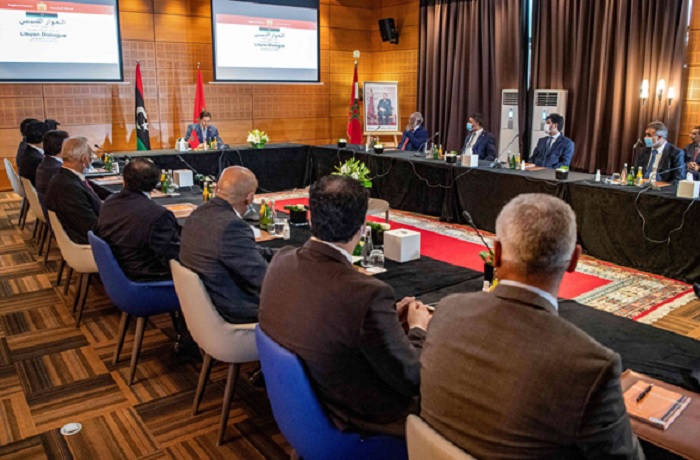
Dampening optimism, the delegation of the Supreme Council sent negative signals, including hints that the position of Central Bank governor could be withdrawn from the region of Barqa.
The agreements reached at the Libyan dialogue session in the Moroccan city of Bouznika are facing a major challenge over the emergence of new gaps in the positions of the two parties due to the hidden agendas of the Muslim Brotherhood that controls the High Council of State.
These gaps emerged after hints from the High Council of State’s delegation that the agreements reached regarding the Central Bank governor’s regional affiliation would be scrapped. This has sparked anxiety and concern that the Libyan Muslim Brotherhood will be able to sabotage the understandings.
Last week, the Moroccan city of Bouznika hosted an intensive round of talks between the delegations of the eastern-based House of Representatives and the Supreme Council of State, which ended with the announcement of preliminary understandings about the distribution of key state positions in Libya and the criteria and mechanisms that must be adopted for those figures to be chosen.
The understandings also included agreements on pending issues and the setting up of mechanisms to fight corruption in “sovereign positions” and to benefit from international experience in building state institutions. The signing of the final draft of these understandings on Saturday was described as a positive breakthrough towards a future political settlement.
Libyan media reported that these understandings included an agreement on the distribution of 7 out of 10 “sovereign positions” among the three main Libyan regions, i.e. Barqa (Cyrenaica), Fezzan and Tripoli.
The two parties confirmed in a joint statement read by Idris Omran of the Libyan parliament, in the presence of Moroccan Foreign Minister Nasser Bourita, that dialogue would resume in the last week of the month to complete the necessary measures to ensure the understandings are implemented.
However, optimism surrounding the signing of the understandings was quickly overshadowed by the Libyan Muslim Brotherhood’s manouevres. A few hours after the signing ceremony, the Supreme Council’s delegation sent negative signals, including hints that the Central Bank governor position would be withdrawn from the Barqa region.
Ali al-Takbali, a member of the Tobruk-based parliament, quickly called on Libyans to peacefully demonstrate in order “to save the country from the international community’s attempts aimed at enabling the Muslim Brotherhood” — which he described as “terrorist”– “from controlling the state.”
He said in televised statements that there is “sincerity from the Speaker of Parliament Aqila Saleh about endeavoring to ensure the success of the negotiations. but the speaker should know that being fascinated by talks with the Muslim Brotherhood is a waste of time as what this group wants is not really what they are negotiating for.”
Saleh had welcomed the results of the Bouznika dialogue session, pointing out that “talks were not about the distribution of positions among people as it was rumoured, but rather for the sharing of sovereign institutions among the regions of Libya, so as to make sure that no region of the homeland is marginalised.”
Libyan parliamentarian Fathi al-Marimi previously confirmed that parliament welcomed the outcome of the Bouznika dialogue as well as the results of the Switzerland talks that were held at the same time.
He pointed out that during these meetings, it was agreed that the Presidency Council would consist of a president, two deputies and a separate prime minister, provided that the PM’s term in office would be 18 months, during which the government and the Presidency Council would seek to organise presidential and parliamentary elections and unify Libyan institutions.
He noted that the city of Sirte would be the seat of the Presidential Council, the House of Representatives and the Central Bank until terrorist militias are eliminated and security is restored in the capital, Tripoli.
However, the statements were not enough to convince Takbali, who stressed that the Muslim Brotherhood “sees Libya as a treasury, and will never allow any party to control the Central Bank of Libya or the National Oil Corporation or anything that generates money.”
Observers believe Takbali’s concern is legitimate and justified, especially as the Libyan Brotherhood’s ambiguous messages coincided with the escalating stances of Salah Al-Nimroush, defence minister in the Government of National Accord (GNA) headed by Fayez al-Sarraj, towards the Libyan National Army (LNA) led by Field Marshal Khalifa Haftar. Nimroush claimed that the LNA repeatedly attempted to breach the ceasefire agreement, and is continuing its military build up.
“We will not give up on Sirte, Al-Jufra, or any inch of Libya. The Sirte and Al-Jufra operations room is an integral part of the Libyan Ministry of Defence, and we are communicating with it and supporting it with all needed equipment, and we are proceeding to fully restore control on the Libyan territory,” Nimroush added in a threatening tone.
The escalation comes as the LNA requests international guarantees on the distribution of oil revenue before reopening the fields and port terminals that have been closed since last January and resuming oil exports.
In this regard, the LNA called for the setting up of a clear and transparent mechanism to ensure the fair distribution of oil revenue to all Libyan people and regions and prevent it from going towards armed militias and foreign mercenaries.
